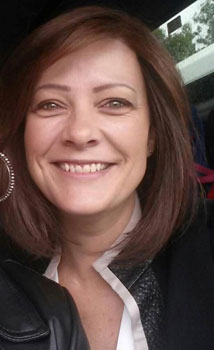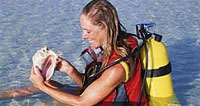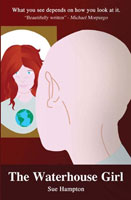Tracey Turco Kokoda Track for Alopecia Areata Interview

Tracey Turco Kokoda Track for Alopecia Areata Interview
Tracey Turco, 43 from Gembrook, Victoria will embark on a grueling ten-day expedition along the historic Kokoda track in Papua New Guinea, this August, to increase awareness of the auto-immune condition, Alopecia Areata and raising essential funds for Australia Alopecia Areata Foundation (AAAF).
Alopecia Areata affects almost 500,000 Australians. It is a medical condition that results in dramatic hair loss in the scalp and elsewhere in the body. The hair loss can range from several bald patches, to total baldness. It affects women, men and children. Alopecia can occur at any age, however, in most cases, it first presents itself during childhood. Currently, there is no cure.
Alopecia Areata is life changing for the thousands of people who are affected by it. It can have a profound psychological and emotional impact on individuals living with the condition. It's not uncommon for people with Alopecia Areata to experience depression, anxiety and social phobias.
Tracey, mum of two, has been living with Alopecia Areata for over nine years and couldn't agree more.
Tracey's journey with Alopecia Areata began when she was 33 years old. Her husband noticed a bald patch at the back of her head. Within a matter of weeks all her hair had fallen out, including her eyelashes, eyebrows and all other body hair.
'It was a huge shock and I was extremely scared. In the beginning it was really difficult to come to terms with it. Everyone has a part of themselves that they like best, well, mine was my hair. To lose it was utterly devastating. It made me and still makes me feel less feminine." Says Tracey.
'Alopecia does not just result in hair loss, it also results in a major change in your identity. You literally become a different person – how you see yourself, how others treat you and how you cope with things, sometimes, literally, overnight."
Tracey wears a wig in public most of the time and says she is coming more to terms with living with Alopecia, but she still sometimes sheds tears over it.
'Although most people react pretty well to my Alopecia, I can sense their pity. Unfortunately, there still is a real lack of understanding. People often say to me, its just hair. I hate that. I would like to say to those people -how would you like to wake up everyday and have no hair and see what you see when you look in the mirror'. Some people say -you must save a fortune on not having your hair done', until I tell them how much I have to spend on wigs each year."
Tracey is undertaking the Kokoda challenge, which will see her hiking through an exhausting 95 kms across rugged mountains, rainforests and jungles, to raise essential funds for AAAF and improve the lives of those living with the condition.
AAAF is a not-for-profit organisation that provides people with Alopecia Areata and their families with essential support. AAAF also funds research into the disease in order to find a cure or acceptable treatment and informs the public about the condition.
'AAAF provides much needed support and opportunity for people with Alopecia to connect with others. Being able to meet other people with Alopecia, ask questions and support one another is huge in helping to feel less isolated and having a more positive life journey.'
'AAAF receives no government funding, and relies on the generosity of the community at large. That is why it is so important for me to do what I am doing and raise as much funds as possible."
'I also hope to raise more awareness about the condition. Awareness is important because the more people who know and understand Alopecia, the easier it is for people with the condition to feel normal about it." Adds Tracey.
Despite the hot, humid and wet conditions, Tracey is excited to be taking on the challenge, particularly as it is the 75th anniversary of the Kokoda Campaign. Tracey will also be joined by Andy Lavender and Greg O' Rourke, from WA. Andy's wife and Greg's son both have Alopecia Areata.
'Over the years, living with Alopecia has made me realise just how strong I am. By taking on this challenge I also hope to prove to myself that Alopecia does not need to define me and that I am capable of just about anything." concludes Tracey.
Chel Campbell, President of Australia Alopecia Areata Foundation said 'We are very proud of Tracey, Andy and Greg's efforts. The Kokoda Track is one of the world's greatest trek and one that will require a huge amount of mental and physical endurance. We wish them the best of luck. We are calling out to the broader community to get behind their efforts and help change the lives of people living with Alopecia Areata."
You can support Tracey's efforts by donating here.
Anyone affected by Alopecia Areata can find support through AAAF. For information on support groups and other services visit: www.aaaf.org.au, Facebook and Instagram
Alopecia Areata affects almost 500,000 Australians. It is a medical condition that results in dramatic hair loss in the scalp and elsewhere in the body. The hair loss can range from several bald patches, to total baldness. It affects women, men and children. Alopecia can occur at any age, however, in most cases, it first presents itself during childhood. Currently, there is no cure.
Alopecia Areata is life changing for the thousands of people who are affected by it. It can have a profound psychological and emotional impact on individuals living with the condition. It's not uncommon for people with Alopecia Areata to experience depression, anxiety and social phobias.
Tracey, mum of two, has been living with Alopecia Areata for over nine years and couldn't agree more.
Tracey's journey with Alopecia Areata began when she was 33 years old. Her husband noticed a bald patch at the back of her head. Within a matter of weeks all her hair had fallen out, including her eyelashes, eyebrows and all other body hair.
'It was a huge shock and I was extremely scared. In the beginning it was really difficult to come to terms with it. Everyone has a part of themselves that they like best, well, mine was my hair. To lose it was utterly devastating. It made me and still makes me feel less feminine." Says Tracey.
'Alopecia does not just result in hair loss, it also results in a major change in your identity. You literally become a different person – how you see yourself, how others treat you and how you cope with things, sometimes, literally, overnight."
Tracey wears a wig in public most of the time and says she is coming more to terms with living with Alopecia, but she still sometimes sheds tears over it.
'Although most people react pretty well to my Alopecia, I can sense their pity. Unfortunately, there still is a real lack of understanding. People often say to me, its just hair. I hate that. I would like to say to those people -how would you like to wake up everyday and have no hair and see what you see when you look in the mirror'. Some people say -you must save a fortune on not having your hair done', until I tell them how much I have to spend on wigs each year."
Tracey is undertaking the Kokoda challenge, which will see her hiking through an exhausting 95 kms across rugged mountains, rainforests and jungles, to raise essential funds for AAAF and improve the lives of those living with the condition.
AAAF is a not-for-profit organisation that provides people with Alopecia Areata and their families with essential support. AAAF also funds research into the disease in order to find a cure or acceptable treatment and informs the public about the condition.
'AAAF provides much needed support and opportunity for people with Alopecia to connect with others. Being able to meet other people with Alopecia, ask questions and support one another is huge in helping to feel less isolated and having a more positive life journey.'
'AAAF receives no government funding, and relies on the generosity of the community at large. That is why it is so important for me to do what I am doing and raise as much funds as possible."
'I also hope to raise more awareness about the condition. Awareness is important because the more people who know and understand Alopecia, the easier it is for people with the condition to feel normal about it." Adds Tracey.
Despite the hot, humid and wet conditions, Tracey is excited to be taking on the challenge, particularly as it is the 75th anniversary of the Kokoda Campaign. Tracey will also be joined by Andy Lavender and Greg O' Rourke, from WA. Andy's wife and Greg's son both have Alopecia Areata.
'Over the years, living with Alopecia has made me realise just how strong I am. By taking on this challenge I also hope to prove to myself that Alopecia does not need to define me and that I am capable of just about anything." concludes Tracey.
Chel Campbell, President of Australia Alopecia Areata Foundation said 'We are very proud of Tracey, Andy and Greg's efforts. The Kokoda Track is one of the world's greatest trek and one that will require a huge amount of mental and physical endurance. We wish them the best of luck. We are calling out to the broader community to get behind their efforts and help change the lives of people living with Alopecia Areata."
You can support Tracey's efforts by donating here.
Anyone affected by Alopecia Areata can find support through AAAF. For information on support groups and other services visit: www.aaaf.org.au, Facebook and Instagram
Interview with Tracey Turco
Question: What inspired you to take on the Kokoda Track to raise awareness for Alopecia Areata?
Tracey Turco: I want to raise awareness of Alopecia Areata because the more people understand about the condition, the easier it is for people living with Alopecia to feel normal about it.
On a more personal note, over the years, living with Alopecia has made me realise just how strong I am. I want to get outside my comfort zone. I want to accomplish something great. I want to prove to myself that Alopecia does not need to define me and that I am capable of just about anything!
Question: Why did you choose the Kokoda Track?
Tracey Turco: The Kokoda track is a true physical and mental challenge and one that I want to experience as my inaugural trek. The AAAF has a Facebook page that I follow and it was there I saw the information for this trek.
What better way to truly challenge myself than to take on one of the most inspiring and challenging treks in the world.
Question: What is Alopecia Areata?
Tracey Turco: Alopecia Areata is a medical condition that results in dramatic hair loss in the scalp and elsewhere in the body. The hair loss can range from several bald patches, to total baldness. It affects women, men and children. Alopecia Areata can occur at any age and currently, there is no cure.
Alopecia Areata is life changing for the people who are affected by it. Alopecia does not just result in hair loss, it results in a constant battle with your identity and self-esteem. You literally become a different person, how you see yourself, how others treat you and how you cope with things.
It can have a huge psychological and emotional impact on individuals living with the condition. It is not uncommon for people with Alopecia to experience depression, anxiety and social phobias.
Question: How does Alopecia Areata affect you on a daily basis?
Tracey Turco: I actually have Alopecia Universalis which is total body hair loss. When it first occurred I found each day a struggle as I was unsure how to deal with it, how to hide it and was constantly wondering whether or not my hair would ever come back.
I don't like looking in the mirror, unless I've got my wig and makeup on, as it's a constant reminder of what I'm missing and I feel depressed in those moments.
Wearing a wig everyday can be uncomfortable especially in summer where it can make my head really hot and itchy but other times I don't mind it as the style is already set and I don't need to do much to maintain it. It can be embarrassing though if the wig shifts and moves and I'm unaware that it's happened.
There can be some funny times though… one time I didn't duck low enough when I was walking under a tree and my head hit a branch and it took my wig off. I had a good laugh about it mainly because there was no one around to witness it, other than my friend; otherwise I think I would've been extremely embarrassed.
Question: When were you first diagnosed with Alopecia Areata?
Tracey Turco: Alopecia Areata, first made its appearance when I was 34 years old. We were at the local pool, when my husband at the time, noticed a bald patch at the back of my head. From there it was a matter of weeks and all my hair had fallen out, including my eyelashes, eyebrows and all other body hair.
The Dermatologist I saw explained more about the condition and this started my understanding of the situation and learning how to start dealing with it. He explained there was a chance my hair would grow back but no guarantee it wouldn't fall out again. To be honest I would rather my hair not grow back because it would be utterly devastating to have it fall out again.
Question: Can you talk about the training you have been doing prior to the grueling ten-day expedition?
Tracey Turco: I have become a Bootcamp regular. It has really helped me build my strength, stamina and cardio. All the personal trainers are fantastic and take an active interest in all areas of health, nutrition and mental wellbeing. My sister and I are also hiking around Mount Donna Buang and the Dandenong Ranges in Victoria, as I have been told that it is a good indication of what Kokoda will be like.
Question: How can Australians support you and the Australia Alopecia Areata Foundation?
Tracey Turco: Apart from raising awareness of Alopecia, one of the other key reasons for taking on the Kokoda Track is to raise essential funds for Australia Alopecia Areata Foundation (AAAF). AAAF provides much needed support and opportunity for people with Alopecia to connect with others. Being able to meet others living with the condition, ask questions and support one another is a huge help in feeling less isolated and in having a more positive life journey.
AAAF receives no government funding and relies on the generosity of the community at large. That is why it is so important for me to do what I am doing and raise as much funds as possible.
You can support me and my teammates, Greg and Andy by donating here.
All funds will go to Australia Alopecia Areata Foundation.
Question: How have the Australia Alopecia Areata Foundation supported you, since your diagnoses?
Tracey Turco: I am generally a very private person and even more so since losing my hair so I'm not comfortable going to support groups or big events but I have been welcomed by AAAF with open arms. The information they share and the new members they introduce has slowly made me aware that I am not alone in this. That alone has lifted a great weight off my shoulders.
Question: What advice do you have for Australians recently diagnosed with Alopecia Areata?
Tracey Turco: Please be strong and don't let this condition define you. I spent too many years in denial and wouldn't allow myself to do so many things and therefore missed out on so much of life. Find good people who can support you and go out and challenge the whole. Find your purpose and go rock it!
Interview by Brooke Hunter
Tracey Turco: I want to raise awareness of Alopecia Areata because the more people understand about the condition, the easier it is for people living with Alopecia to feel normal about it.
On a more personal note, over the years, living with Alopecia has made me realise just how strong I am. I want to get outside my comfort zone. I want to accomplish something great. I want to prove to myself that Alopecia does not need to define me and that I am capable of just about anything!
Question: Why did you choose the Kokoda Track?
Tracey Turco: The Kokoda track is a true physical and mental challenge and one that I want to experience as my inaugural trek. The AAAF has a Facebook page that I follow and it was there I saw the information for this trek.
What better way to truly challenge myself than to take on one of the most inspiring and challenging treks in the world.
Question: What is Alopecia Areata?
Tracey Turco: Alopecia Areata is a medical condition that results in dramatic hair loss in the scalp and elsewhere in the body. The hair loss can range from several bald patches, to total baldness. It affects women, men and children. Alopecia Areata can occur at any age and currently, there is no cure.
Alopecia Areata is life changing for the people who are affected by it. Alopecia does not just result in hair loss, it results in a constant battle with your identity and self-esteem. You literally become a different person, how you see yourself, how others treat you and how you cope with things.
It can have a huge psychological and emotional impact on individuals living with the condition. It is not uncommon for people with Alopecia to experience depression, anxiety and social phobias.
Question: How does Alopecia Areata affect you on a daily basis?
Tracey Turco: I actually have Alopecia Universalis which is total body hair loss. When it first occurred I found each day a struggle as I was unsure how to deal with it, how to hide it and was constantly wondering whether or not my hair would ever come back.
I don't like looking in the mirror, unless I've got my wig and makeup on, as it's a constant reminder of what I'm missing and I feel depressed in those moments.
Wearing a wig everyday can be uncomfortable especially in summer where it can make my head really hot and itchy but other times I don't mind it as the style is already set and I don't need to do much to maintain it. It can be embarrassing though if the wig shifts and moves and I'm unaware that it's happened.
There can be some funny times though… one time I didn't duck low enough when I was walking under a tree and my head hit a branch and it took my wig off. I had a good laugh about it mainly because there was no one around to witness it, other than my friend; otherwise I think I would've been extremely embarrassed.
Question: When were you first diagnosed with Alopecia Areata?
Tracey Turco: Alopecia Areata, first made its appearance when I was 34 years old. We were at the local pool, when my husband at the time, noticed a bald patch at the back of my head. From there it was a matter of weeks and all my hair had fallen out, including my eyelashes, eyebrows and all other body hair.
The Dermatologist I saw explained more about the condition and this started my understanding of the situation and learning how to start dealing with it. He explained there was a chance my hair would grow back but no guarantee it wouldn't fall out again. To be honest I would rather my hair not grow back because it would be utterly devastating to have it fall out again.
Question: Can you talk about the training you have been doing prior to the grueling ten-day expedition?
Tracey Turco: I have become a Bootcamp regular. It has really helped me build my strength, stamina and cardio. All the personal trainers are fantastic and take an active interest in all areas of health, nutrition and mental wellbeing. My sister and I are also hiking around Mount Donna Buang and the Dandenong Ranges in Victoria, as I have been told that it is a good indication of what Kokoda will be like.
Question: How can Australians support you and the Australia Alopecia Areata Foundation?
Tracey Turco: Apart from raising awareness of Alopecia, one of the other key reasons for taking on the Kokoda Track is to raise essential funds for Australia Alopecia Areata Foundation (AAAF). AAAF provides much needed support and opportunity for people with Alopecia to connect with others. Being able to meet others living with the condition, ask questions and support one another is a huge help in feeling less isolated and in having a more positive life journey.
AAAF receives no government funding and relies on the generosity of the community at large. That is why it is so important for me to do what I am doing and raise as much funds as possible.
You can support me and my teammates, Greg and Andy by donating here.
All funds will go to Australia Alopecia Areata Foundation.
Question: How have the Australia Alopecia Areata Foundation supported you, since your diagnoses?
Tracey Turco: I am generally a very private person and even more so since losing my hair so I'm not comfortable going to support groups or big events but I have been welcomed by AAAF with open arms. The information they share and the new members they introduce has slowly made me aware that I am not alone in this. That alone has lifted a great weight off my shoulders.
Question: What advice do you have for Australians recently diagnosed with Alopecia Areata?
Tracey Turco: Please be strong and don't let this condition define you. I spent too many years in denial and wouldn't allow myself to do so many things and therefore missed out on so much of life. Find good people who can support you and go out and challenge the whole. Find your purpose and go rock it!
Interview by Brooke Hunter
Have You Seen This?
MORE








